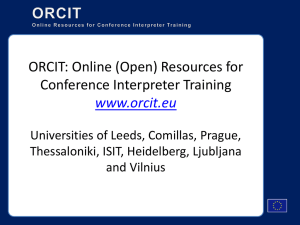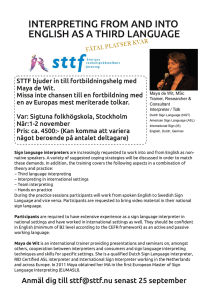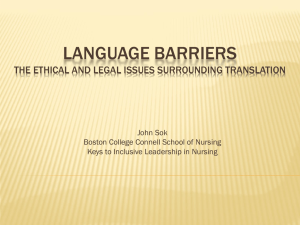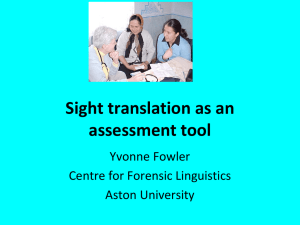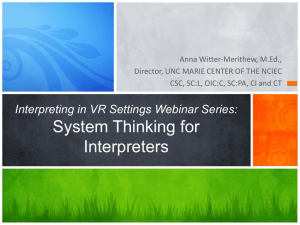Interpreting Frequently Asked Questions 2013
advertisement
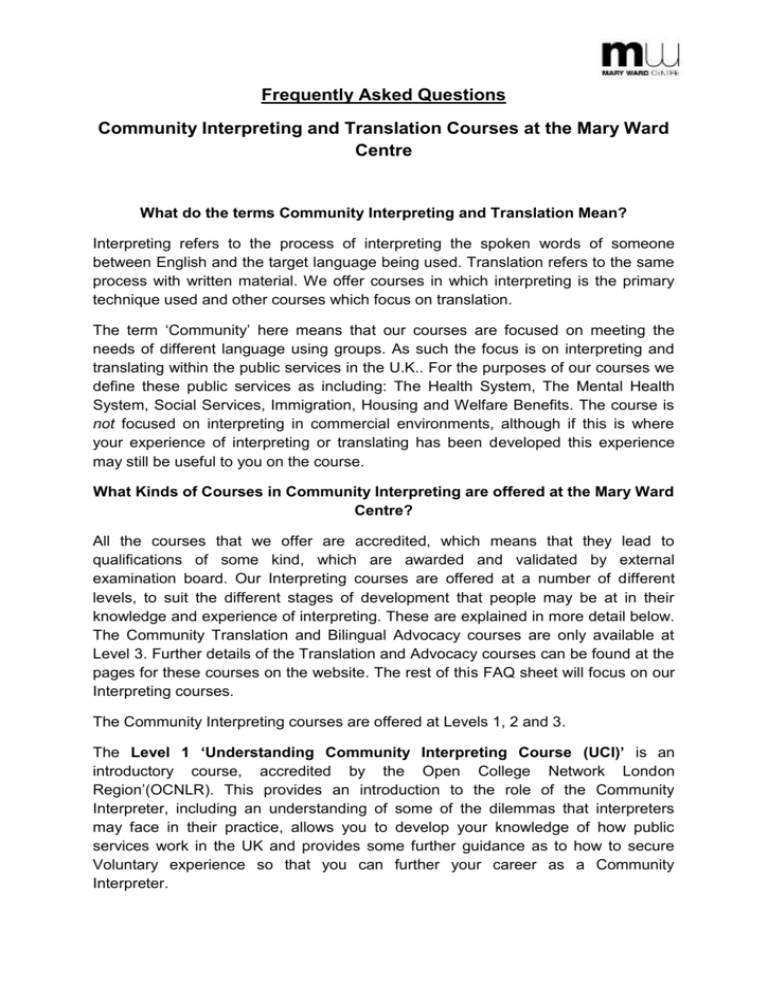
Frequently Asked Questions Community Interpreting and Translation Courses at the Mary Ward Centre What do the terms Community Interpreting and Translation Mean? Interpreting refers to the process of interpreting the spoken words of someone between English and the target language being used. Translation refers to the same process with written material. We offer courses in which interpreting is the primary technique used and other courses which focus on translation. The term ‘Community’ here means that our courses are focused on meeting the needs of different language using groups. As such the focus is on interpreting and translating within the public services in the U.K.. For the purposes of our courses we define these public services as including: The Health System, The Mental Health System, Social Services, Immigration, Housing and Welfare Benefits. The course is not focused on interpreting in commercial environments, although if this is where your experience of interpreting or translating has been developed this experience may still be useful to you on the course. What Kinds of Courses in Community Interpreting are offered at the Mary Ward Centre? All the courses that we offer are accredited, which means that they lead to qualifications of some kind, which are awarded and validated by external examination board. Our Interpreting courses are offered at a number of different levels, to suit the different stages of development that people may be at in their knowledge and experience of interpreting. These are explained in more detail below. The Community Translation and Bilingual Advocacy courses are only available at Level 3. Further details of the Translation and Advocacy courses can be found at the pages for these courses on the website. The rest of this FAQ sheet will focus on our Interpreting courses. The Community Interpreting courses are offered at Levels 1, 2 and 3. The Level 1 ‘Understanding Community Interpreting Course (UCI)’ is an introductory course, accredited by the Open College Network London Region’(OCNLR). This provides an introduction to the role of the Community Interpreter, including an understanding of some of the dilemmas that interpreters may face in their practice, allows you to develop your knowledge of how public services work in the UK and provides some further guidance as to how to secure Voluntary experience so that you can further your career as a Community Interpreter. We recommend this course to those who may have limited or no experience of acting as a Community Interpreter in the UK, or to candidates who we feel may need more time to develop the kinds of skills and experiences necessary to move onto higher level courses in this area. It is also an ideal course for you if you are unsure if working as an interpreter is the right course for you and are trying to get more information. Completion of the Level 1 course will not normally be a sufficient qualification for you to find paid employment as a Community Interpreter, but it will assist you in developing more experience and we often expect that applicants to the higher level courses to have completed the Level 1 course, or some other similar qualification in interpreting, first. The Level 2 ‘Developing Your Skills as a Community Interpreter’ course is designed for those who may have completed the Level 1 UCI course but who still may need to spend some more time developing their skills in written English, their Study Skills, and/or their knowledge of public service provision, in order for them to be confident of progressing on to the Level 3 course. The Level 2 course works intensively on developing your skills in these areas, whilst embedding this in the context of broadening your understanding of Community Interpreting. The course is accredited as a Level 2 Award in Progression by OCNLR. The Level 3 Certificate Course in Community Interpreting is an intensive and demanding qualification course accredited by Ascentis. Successful completion of this qualification is normally accepted by most Interpreting agencies as being the required qualification needed to be appointed to undertake paid professional assignments as a Community Interpreter in most areas of the public services (see below for some exceptions to this relating to working as a Court Interpreter). The Level 3 Certificate covers the knowledge and techniques needed by an interpreter working with the community. This includes issues of professional practice, including knowledge of the code of conduct that interpreters must abide by, as well as the practical aspects of how to prepare for and carry out an interpreting assignment and how to deliver the best service for the parties involved. There is also an introduction to the different public services on the course and you will be taught how to research these services in order to find appropriate terms that may not exist in your target language. The course is taught by experienced Community Interpreters, along with guest speakers with extensive experience of working in the different areas of the public services. In addition, some of your work on the course will be assessed by specialists in your target language. Assessment on the course includes completing assignments that cover 7 different units. This includes interpreting practice that is assessed through roleplays that are completed in class and recorded as evidence for the external moderator and your language assessor. These roleplays include some sight translation. You will also need to produce a bilingual glossary of a range of terms from the public services translated into your target language. There are also a range of assignments that cover issues of professional practice, research in how to research public services and services available to the community, as well as self assessment and reflection in how you perform as an interpreter and what could improve your practice. I am not sure which level of course would be the right one for me, can I get some advice and guidance on this? If you would like some further guidance about the courses, you can contact the department via email at: interpreting@marywardcentre.ac.uk Further guidance will also be available at the induction sessions which we run when assessing applications to the course (see below). How Can I Apply for Course? As these are accredited courses, it is not possible to simply enrol on the course. We need to undertake an initial assessment and induction process with all potential students who we are considering offering a place on the course to. The content of these assessments varies according to the level of the course to which you are applying. For all courses we aim to assess what is relevant to your likely success on a Community Interpreting course, and this will include at least the following: The fluency of your spoken English The fluency and accuracy of your written English Your ability to process and analyse written texts of the sort you can expect to encounter on the level of the course you are applying to The level of your study skills Your knowledge and understanding of the public services in the UK Your knowledge of the language community you would be looking to act as an interpreter for Your experience of acting as an interpreter (preferably in the context of public service interpreting, but other forms of interpreting experience may be relevant and will be taken into account in assessing applications) Obviously, the level of detail and difficulty required by this assessment process is different between the different levels of the course. We would not necessarily expect, for example, that an applicant to the Level 1 UCI course would have a great deal of experience of acting as an interpreter, or a very detailed knowledge of public services, but we would still need to see make some sort of assessment of this in order to advise you appropriately. We usually find that the courses are very popular and that we have more applicants to the courses than we have spaces for. The first stage of the application and initial assessment process is the completion of the application form and we use the information that is provided to us there as a way to shortlist candidates, so it is important that you pay close attention to the information that you include there. Following receipt of an application form, we will first of all contact you via email to acknowledge that we have received this. Once we have a reasonable number of application forms, we will shortlist candidates based upon this information and contact you with the following outcomes: To invite you to come along to an induction and initial assessment session for the level of course that you applied for To invite you to come along to a an induction and initial assessment session for a different level of the course. This can happen if we think that another level of the course (either a higher or a lower level course) would be the most suitable for you, based on the information you have provided on the application form To suggest alternative courses that may be more suitable for you at this time. This may happen if, for example, it appears from the information provided on the application form that you would need further qualifications or practice in developing your level of written English before undertaking an Interpreting course. At this stage, should you wish to continue with your application to the course, the next step would be for you to attend the induction and initial assessment session to which you have been invited. We will hold induction and initial assessment sessions on a rolling basis prior to the start of the course, rather than on one set date. Once we have received sufficient applications for an induction session to be worthwhile we will contact you to invite you to an induction and initial assessment session. This does mean that places on the course can be offered to people and confirmed well before the start date of the course, so you are advised to apply early. At the induction session you will have the opportunity to find out more about how the course works, to meet with the course tutors and to ask any questions that you may have. It also gives us the opportunity to undertake assessments to ensure that the course is at the right level for you. Following the induction session, we will then contact all applicants with the outcome. As above, this will take one of the following forms: An offer of a place on the level of the course to which you applied An offer of a place on an alternative level of interpreting course To suggest alternative courses that might be suitable for you It is not unusual for us to applicants to the Level Certificate course that it would be better to do either the Level 1 or the Level 2 course first, depending upon people’s previous experience, existing qualifications and performance in the initial assessment. This is because the Level 3 course is a highly intensive and demanding course and we want to ensure that people have the very best chance of succeeding on it, but often this will require some more preparation. In these cases we would tend to offer people who do not already hold qualifications in interpreting a place on the Level 1 UCI course and for people who may have already completed the Level 1 course, but who would need to develop their academic skills further and/or who may need more experience before undertaking the Level 3, would be referred to the Level 2 ‘Developing Your Skills in Community Interpreting’ course. If I Apply for, or am offered a place on, the Level 1 course would I then have to do the Level 2 course before I can do the Certificate qualification? No. The kind of progression route that you take will depend on your individual circumstances. Some people will be able to move from a Level 1 Course to the Certificate qualification. Others will need the extra time to develop their skills further. When considering places for the Level 3 course we need to consider all the different aspects that are required of students on this course. Can native English speakers apply for the Interpreting course? Yes, although you would need to demonstrate that you have involvement with the community for which you hope to be interpreting in the future. You will normally be expected to have lived in a country in which your target language is spoken. For native English speakers, or for people who have had much of their school-age educational experience in the U.K, we will need to assess your target language skills at the induction session. I am a fluent speaker of my target language but my ability to read or write in my target language is less strong, can this affect my application? It can do. For the Level 3 Certificate course, there are two compulsory elements that require you to be able to read and write in your target language. There is a mandatory unit in Supporting Interpreting Through Sight Translation, because this reflects a very common feature of some interpreting assignments. In addition, you will need to develop an extensive glossary of public service terms in both English and the target language and this will normally be completed as a written assignment, so confidence in your written ability in the target language is a requirement of the Level 3 course. I don’t have much experience of acting as an interpreter, where can I get more of this? It is unlikely that you will be able to get experience as an interpreter by going directly to public service organisations, since they will normally only be able to use interpreters who are already qualified. Instead it would be better to apply to community organisations who work with speakers of your target language. You will need to research community organisations and be prepared to offer your time as a volunteer with them. You are advised not to say that you are only prepared to work as a volunteer interpreter but instead to be prepared to act as a general volunteer which will usually lead to some interpreting once you have become established. What Level of English is required to join the course? Your should have native speaker competence in your target language and as a minimum you must have Level 2 (Advanced level, GCSE A*-C or roughly B2 of the Common European Framework) in all areas of your English language competence. For the level 3 Certificate course you will be assessed to see that you have sufficient academic study skills to be able to complete a demanding Level 3 course which requires the ability to complete a significant volume of analytical written assignments. How does assessment take place once I am on the course? Is there an exam? For all levels of the course, assessment takes place via the completion of a range of assignments and the submission of a completed portfolio of work that includes all of these assignments. These assignments are marked by course tutor and are internally moderated by other members of the teaching team. Finally, they also have to be sampled by an external moderator who is appointed by whichever exam board is awarding the qualification that you are taking. The assignments on the course can take many forms, including research and analysis of sources of information on community organisations and public services, analysis and self-evaluation of the skills and principles required to act as a community interpreter, developing glossaries of terms used in community interpreting assignments within the public services, analysis of issues of professional practice, and so on. There is no formal, timed, written examination. The Level 3 certificate does require you to successfully complete a role play community interpreting assignment, which is completed and formally assessed in class and by the specialist language assessor. We try to make this assessed performance as realistic as possible, but it is not an exam as such. What work can the Level 3 Certificate lead to? It is rare to be employed full-time as a community interpreter. Most interpreters work flexibly on a freelance basis and are often employed by agencies. The Level 3 Certificate is becoming the industry standard qualification accepted by most agencies as a working qualification. As it is rare to work full-time as an interpreter it is probably best to see this as one of a portfolio of skills that you might use to work in the community. Can I work as a court interpreter with the Level 3 certificate? The certificate does not cover working in the criminal or civil legal system at all and to do this kind of work you should complete the Diploma is Public Service Interpreting (DPSI) or the Metropolitan Police Language test. For further information see the website of the Chartered Institute of Linguists http://www.iol.org.uk/ What other courses can I do after finishing the interpreting course? Apart from the Diploma in Public Service Interpreting (DPSI) which is offered in some Further and Higher Education institutions, following successful completion of the Level 3 Certificate in Community Translation (or you may opt to follow the Translation route first as a course in its own right) or the Level 3 course in Community Advocacy offered by the Mary Ward Centre. Further details of these courses are available at the sections of the website dedicated to these courses. In addition, our partner organisation the Workers Educational Association (WEA) also offer a course for interpreters who wish to work in the specialised field of Child Protection. For further information about this course, please contact Phyllis Acosta on pacosta@wea.org.uk What are the fees for the Community Interpreting Courses? The Level 1 UCI course and the Level 2 Developing Your Skills as Community Interpreter course have fees as follows: Level 1 Understanding Community Interpreting: Full Fee £154; The Mary Ward Concessionary Fee £55, Active Benefit Concessionary Fee £0 Level 2 Developing Your Skills As A Community Interpreter: Full Fee £154; The Mary Ward Concessionary Fee £85; Active Benefit Concessionary Fee £0 The ‘Active Benefit Concessionary Fee’ applies only to those who are in receipt of Job Seeker’s Allowance (JSA) and Employment Support Allowance (ESA) at the time of enrolment. The Mary Ward Concessionary Fee is a rate of fee that the Mary Ward Centre has chosen to make available to support access to its courses. This applies to those who are in receipt of another form of income-based benefit such as: Housing Benefit, Council Tax Benefit, Working Families Tax Credit (but note not Child Tax Credit or Child Benefit). Fees for the Level 3 Certificate Course and 24+ Advanced Learning Loans From September 2013 the way that the government, though the Skills Funding Agency, funds courses at Level 3 and above for people aged 24 and over changes for all Colleges in England and Wales. Effectively, there will be no government funding for these courses; instead, people aged 24 and over will eligible to take out a new 24+ Advanced Learning Loan to cover some, or all, of the costs of their tuition. This change to the funding of Level 3 courses does make them more expensive than has been the case in the past but the system of loans is very similar to those that have been introduced for Higher Education, meaning that you would only begin to pay the loan back once your earnings are higher than £21,000 per year. Under the new system the fee for the Level 3 Certificate in Community Interpreting is £724. Concessionary fees are no longer available if you are aged 24 and over, but the 24+ Advanced Learning Loans are not means-tested and your eligibility for a loan and how much you can borrow does not depend upon you income. For further information about 24+ Advanced Learning Loans you can visit this website: http://www.practitioners.slc.co.uk/media/474817/24__faq_v2.pdf Further information is also available at the College website here: www.marywardcentre.ac.uk
